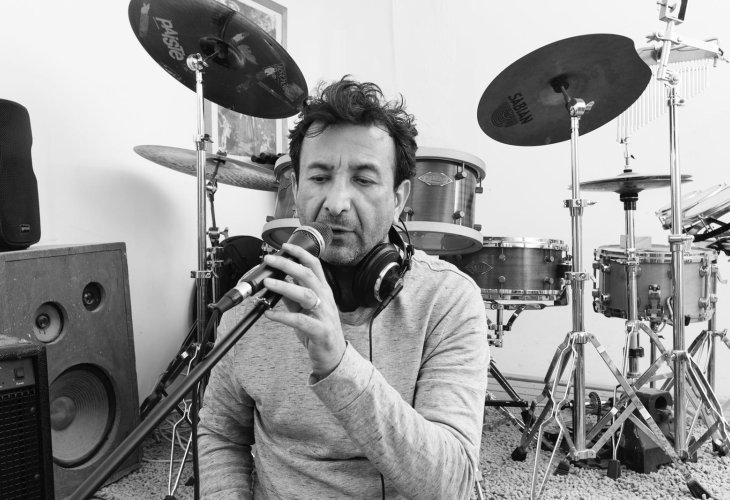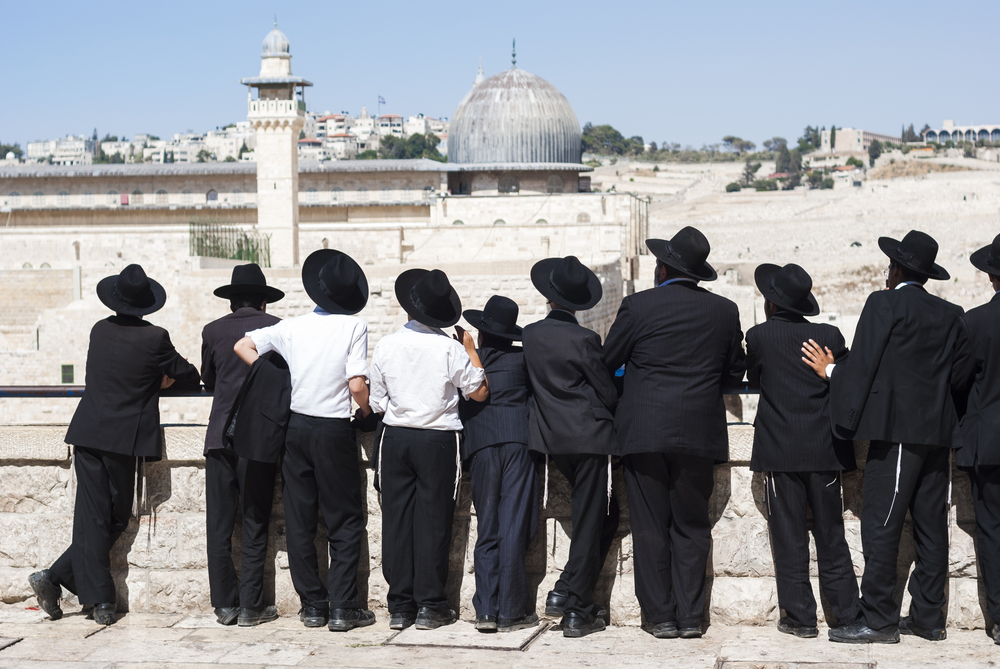Shai Lahav: "We Should Thank the Haredim, We Are Here Because of Them"
Musician Shai Lahav, not yet wearing a kippah, is convinced that a quiet revolution is happening in Israel, which will eventually erase the religious divide. "Hating Haredim questions the reason why you are here. You do not need to be religious to say that."
 Shai Lahav (Photo by: Ran Golani)
Shai Lahav (Photo by: Ran Golani)"Just as the ethnic divide of the 1980s vanished - the people spoke and united - the religious divide will disappear. There used to be terrible discrimination, but not anymore," says creator and musician Shai Lahav.
Shai (50) is married and resides in Tel Aviv, considered a respected musician. He is a singer, keyboardist, and producer. He was born and raised in Tiberias. "The Sea of Galilee was a central part of my childhood," he recalls, "almost every day after school, it was the ultimate place of amusement. From the window of my house, I used to see the Sea of Galilee and the Golan Heights, today you see the Hermon. In my childhood, life was simple, I walked to school. Tiberias was like a small town where you knew everyone - and everyone knew you, there were no smartphones, it was a different era, I enjoyed growing up in Tiberias."
As a teenager, did you feel like you wanted to break out of the periphery? To succeed in the big city?
"I studied at Amal High School. My older brother, Ofer, achieved great distances. He is 10 years older than me and is a professor of astronomy, so I never felt like I lived on the edge or in the periphery. I didn’t know about it until I was told. I dreamed of being an actor, I thought about studying theater, but music captivated me. It pursued me, a kind of process of no choice, although I didn’t study, and in fact, I have no formal musical education. In high school, I met Ran Golani, also from Tiberias, and we both started playing as high school students. In 2018, I found an old cassette with old recordings, and we decided to release it as an album."
"Bridging and Connecting"
What do you think about what's happening in the city today?
I haven’t visited Tiberias since the change of mayors, but I can say that I don't accept hatred towards Haredim; it is distasteful to me, unbearable. Tiberias has always been a holy city, with rabbis and sages buried there, so who said it’s a holiday city at all? Because it was Prime Minister David Ben-Gurion’s holiday city?
"I see things from a historical perspective – those who have preserved the Torah for at least 2,500 years, those weren't the Jews of the Enlightenment movement but what is now called – 'the Haredim'. It is the hardest to preserve knowledge passed down from generation to generation. Most knowledge in the world has disappeared, while our Rabbi Yehudah the Prince wrote the Mishnah, and since then it has been preserved word by word, without print and without a large library like the Alexandria library. Who preserved it? Those called 'Haredim'. One can also see that the first Zionists wave the Torah, but who preserved it? Those Haredim. They wanted to create a new, different Jew, while the reason there’s a right to exist in the land – militarily and morally – is by virtue of a divine promise. A Jew who does not recognize this might find himself in a problem, he becomes ostensibly an occupier not in his own land. After all, it supposedly isn’t fair if we are only here because of the army."
Do you voice your opinions openly?
"Yes, everyone who knows me is aware of my opinions, which are well-reasoned. These are not ideologies but facts. I am not saying I am against anyone, but I think reality is being misinterpreted. I am also not angry with anyone, and I have no problem sitting with a person whose views are opposite mine."
Do you not feel the discourse has become too extreme?
"I don’t think there’s such a thing as extreme discourse. Discourse is created by humans. Just like with food, you have to pay attention to what you listen to and say, you have to take responsibility. I say: listen to Rabbi Zamir Cohen and Rabbi Yosef Ben-Porat, so you will learn how to create a bridge between parts of the people of Israel. It all depends on what you want to experience."
Saying Thank You to the Haredim
Tell us personally - what sparked your interest in Judaism?
"I love learning history by myself, but my real interest began through the Hidabroot channel. I saw Rabbi Yitzchak Fanger, and I started listening to Rabbi Zamir Cohen, who impressed me greatly. He is precise with every word, no exaggerations, everything is restrained, measured, balanced, and at a very high level. I found it interesting. I love learning about ancient Egypt and Rome, and I began 'swallowing' Rabbi Zamir's lectures. I recorded and listened to them – it was fascinating. I already knew previously that there is a Hashem, but I listened to interesting lectures on a variety of fascinating topics. It is clear to me that Rabbi Zamir implies that a person should fulfill all the mitzvot, and he doesn’t mean for me to stay like this. His connection to science and archaeology draws me in, as do the lectures of Rabbi Yosef Ben-Porat, who talks about history, and I feel it’s close to me."
 (Photo by: shutterstock)
(Photo by: shutterstock)Do you see yourself as a believer?
"I believe in Hashem, in the promise given to Abraham, Isaac, and Jacob, and the giving of the Torah to Moses our Teacher. I am a seeker by nature. I went to read the words of the prophets – you can't make up such accurate prophecies, we are one of the generations that Hashem will bring us on eagles’ wings from the most distant places."
Have you been strengthening your faith in recent years?
"I am not from the group of artists who wear a kippah, but I do other things: I live in the Land of Israel, read the weekly Torah portion every Shabbat, Psalms, the letter of the Ramban as often as possible, and occasionally the Book of Esther. I also read Psalms and try to connect through my world to Hashem."
What do you think, for example, about public desecration of Shabbat?
"I wish that in our public space, there would be no driving on Shabbat and no work on Shabbat. We have a religion of work; it makes more sense to have a day off in the middle of the week, so everyone can do as they please. I also don’t understand why they criticize yeshiva students. In my estimate, one day we will reach a situation where those who cannot identify with the fact that the basis for our existence here is Judaism will want to leave the country because international cosmopolitan values will contradict its existence. The next generations will understand that everything is in its place, there will be a different fusion of Israeliness, the natural basis will be faith, a search for religion and who we are, not for nationalism. I expect that just as students and academic people are respected, so should Torah scholars be respected. I estimate that just like the ethnic divide of the 1980s disappeared, the people spoke and united, this is what will happen with the religious divide. After all, there was once terrible discrimination, but not anymore."
And what is your most important message?
"The most important message is that it is very good that there is such a thing as 'Hidabroot'. The channel, the website, the videos, everything is really amazing. I meet with Haredi friends, and they also learn and listen to Rabbi Zamir. It is a bridge that brings both sides closer. I am certain that in the future, the new Israeli will say – 'I am a believing Jew who is here thanks to a divine promise'. I see this change happening before my eyes. Americans have already reached the absolute connection between Hashem and the state, so why shouldn't we reach that in Israel? That the Prime Minister ends a speech with: 'May Hashem bless Israel' – is that too much to expect? In the future, it will be clear. As it says in Psalms: 'The beginning of wisdom is the fear of Hashem'. If you don’t believe in Hashem, you have no chance to be wise. Hating Haredim questions the reason you are here. If you hate those who have preserved the Torah for 2000 years - then what are you doing here? You should thank them. You do not need to be religious to say that."

